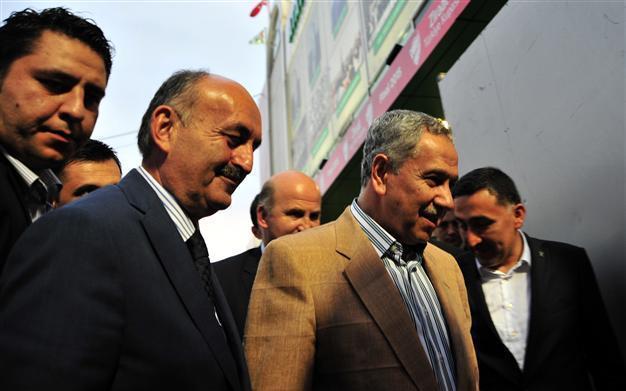Turkey warns US and coalition against demographic change in Syria
ANKARA

AA Photo
The Turkish government has voiced its unease over perceived efforts for the unification of Kurdish cantons in northern Syria, reiterating that Ankara will “not allow” the emergence of any potentially threatening entity in the war-torn country.Deputy Prime Minister Bülent Arınç said Turkey had taken measures both regionally and inside its own borders for its domestic and external security, adding that its interests sometimes differ from those of anti-Islamic State of Iraq and the Levant (ISIL) coalition partners.
“Sometimes differences are occurring between priorities and interests of Turkey and of those powers’ and sometimes they match,” Arınç said late on June 15, after the first cabinet meeting since the June 7 general election.
He expressed Turkey’s continued uneasiness over the Syrian Democratic Union Party (PYD)’s military wing, known as the People’s Protection Units (YPG), which has emerged as the main partner on the ground in Syria for the U.S.-led anti-ISIL coalition.
Amid signs that Kurdish forces have sought to “bring together cantons” in Syria, Turkey has conveyed its warning to the U.S. and other coalition members about the risk of demographic “cleansing and the placement of some elements” by the YPG and the PYD after the airstrikes, Arınç said.
“People of the bombed places were ethnically cleansed by the PYD and the YGP, as well as by Daesh [ISIL]. These are strange relationships and alliances ... We are seeing signs of work underway on a formula to bring together the cantons,” he added.
The deputy prime minister also touched on the latest situation at the border, saying Turkey would not close its borders to Syrians seeking refuge if their lives are in danger but also describing the situation as “unsustainable.”
In the June 15 cabinet meeting, they discussed military measures to maintain border security, Arınç said, noting that measures for domestic security were also on the agenda.
“Turkey is the only country that opens it arms to the oppressed,” he said, referring to the 1.6 million Syrian refugees currently in the country.
“The free world, Western countries, democratic countries that believe in human rights must surely know that the task [to aid refugees] also falls on them,” Arınç added.
In a sign of urgency and significance attributed to the issue, and contrary to the composition of regular cabinet meetings, Chief of General Staff Gen. Necdet Özel and Land Forces Commander Hulusi Akar attended the meeting in order to brief ministers.
Arınç’s statement comes after the Free Syrian Army and the YPG wrested control of the Syrian city of Tal Abyad, near Turkey, from ISIL.
Almost 17,000 civilians from Syrian villages and towns have crossed the border into Şanlıurfa in past two weeks, as the YPG carried out operations with the help of U.S.-led coalition airstrikes in the northeastern regions of Tal Abyad and al-Hasakah to push back ISIL militants.
The PYD, of which the YPG is the military unit, announced in November 2014 that all Kurdish areas in northern Syria would declare all its autonomous regions as “cantons,” which are not internationally recognized.
Turkey considers the PYD to be an offshoot of the Kurdistan Workers’ Party (PKK), which has for decades waged a bloody insurgency in the country. The PKK is listed as a terrorist group by Turkey, the U.S. and the European Union.
















